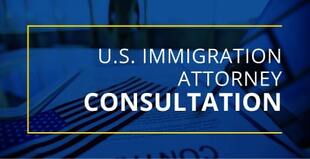
Employment-Based Immigration
to the United States
Many people see immigrating to the U.S as the main goal of their lives. But what can one do if you have neither American relatives nor a million dollars to invest in the U.S economy? You might consider the Green Card lottery, but it’s not a sure thing. Good fortune may never shine on you. Trying to find a potential spouse abroad is an option, but not necessarily a very good one. You might consider arranging to give a birth to a child in the U.S., but that would make the newborn a citizen, not the parents. The parents have to wait 21 years to immigrate on this basis. One of your best options is to focus on educational and professional avenues. Working for an American employer may be one of the ways to immigrate to the U.S.
Advantages of employment-based immigration to the U.S.
The process of employment-based immigration may be difficult and challenging, requiring a lot of effort, expense, and bureaucratic red tape. But this way suits you if:
- Another way is not available.
- There are employment opportunities the will lead to immigration in a relatively short period of time.
- You don’t have significant financial assets.
- If your value as an employee of an American company can be established.
- If you wish to take your family to the U.S. with you.
Which visas provide an opportunity to work in the U.S.A.?
Employment-based visas are divided into those that provide an opportunity to immigrate and become a resident of the United States, and temporary, non-immigration visas.All immigration visas require a waiting period for processing because the demand is so high, there are a limited number of processors, and the process itself is lengthy.Employment-based visas may be best for a relatively shorter approval time.The process begins when an employer with an open position obtains approval from the U.S. Department of Labor agreeing that the vacancy is unable to be filled by individuals already living in America. The employer then files with the USCIS, requesting a visa on the employee’s behalf.Before that, you must find such an employer. It’s easier to find a company ready to provide a short-term contract and to receive a short-term employment visa for that position.
There is a wide range of visas for entering the States on the basis of employment.
Short-term employment-based visa
Getting a short-term, employment-based visa may be more realistic for most people because not every employer is ready to invite a foreign employee for permanent work without a trial period. Moreover, these visas do not presuppose the much higher qualification demands required for a permanent work visa.Consider participating in temporary experience-sharing programs and educational activities to network some new acquaintances. Do so may help you find an employer for an employment visa. The short-term employment visas are the following:

| Visa type | Coverage |
| J-1 |
Exchange visitors including Au pair program. This non-immigration visa is authorized for teachers and professors, short-term educational program participants, summer Work & Travel programs, and other exchange visitors. The visa is restricted to participation in a program. To get the visa an individual must be selected to participate in an approved program or be invited to an approved event. The applicant must file a USCIS DS-160 form online and take the invitation to an American consulate. |
| I |
Representatives of foreign press, radio- media. The visa is for media-representatives coming to the U.S. on informational, research, or educational purposes. Activities must have an international character and be connected with the collection of information on current events or reporting news. |
| Н-2А Н-2B |
Seasonal and temporary worker, agricultural and other specializations. From time to time there is a deficit in some sectors of the labor force in the U.S. As a rule, these deficits are connected with seasonal works, such as harvesting at a farm. |
| Н-3 |
Temporary trainee, special education Programmers and other IT-specialists, along with representatives of other professions, are able to come on this visa for qualification testing and work-training. |
| P-1 |
Athletes taking part in and/or preparing for a competition An internationally recognized athlete may obtain this visa. Trainers and coaches are also covered by the P-1. |
| P-2 P-3 |
Artist, actor, or entertainer Two types of visa, given to participants of programs and shows, aimed at joining, conducting, teaching, and preparing for different events. |
| Q-1 | International cultural exchange participants |
Student F-1 visa and a work permit

The F-1 is an immigration option for people having no professional skills to become a student at a recognized American educational institution. It may be a college, a technological school, or a university. One can ask for the U.S. student visa on an invitation from the educational establishment indicating the individual has been accepted as a student. The F-1 is a short-term visa and it doesn't give a permanent residency, but it does provide an opportunity to settle in the U.S. and become grounds for future immigration. In other words, during your studies, you may be able to find an employer who will help you to receive a permanent, employment-based visa.
A student visa allows the holder to obtain a work permit to help cover living and study costs.
A long-term employment-based visa
| Visa type | Coverage |
| O-1 | Individuals with extraordinary abilities in science, art, education, business, and sports. |
| H-1B | For highly-qualified employees with broad experience. |
| L-1 | For leaders of affiliations – executives and managers – of American companies, who have work experience of more than a year and are closely tied with an American company. |
| Н-1C | For qualified nurses working in a health professional shortage area as determined by the U.S. Department of Labor. |
These visas grant a permit to live and work temporarily in the U.S. with the opportunity to change your immigration status to permanent. The H-1B specialist visa is the most popular of long-term, employment-based visas.
H-1B specialty visa and permanent residency status acquisition
The H-1B visa is designated for people with a high level of qualification, education, and experience. The most common jobs for H-1B immigration are those having to do with information technology. The H-1B Visa is granted for a period up to three years with possible extension of up to six years.
The main advantages of the H-1B are:
- It's a multi-entrance visa. The visa holder is allowed to cross the border in both directions during the entire visa validity period.
- The employment visa holds no restrictions. There is no limit on how many hours a recipient may work and it is possible to change employers during the visa validity period.
- You become a temporary U.S. resident and pay taxes in the U.S. territory.
- After two years of continuous employment at an American company, the visa holder may file a petition for the coveted Green Card.
- Immediate family members (spouse and unmarried children under 21) are allowed to accompany the visa holder.

An applicant must meet the following criteria:
- Bachelor or higher degree. In some unusual cases, proof of a high-school education may be acceptable on the basis of a broad recognition of your status as a specialist. Evidence to your status could include international awards, publications in professional journals, substantial work experience in a field, or employment at globally-renowned companies.
- Qualification must meet the open position. Your experience and expertise must be in the field in which you are applying to work.
H-1B visa approval stages:
The first stage – submitting an invitation by an employer
An employer (physical or judicial entity) must receive approvals to invite a foreign employee from the U.S. Department of Labor and USCIS. The company must be able to prove its own reliability and financial solvency, as well as the compatibility of the candidate with the qualification criteria for the position.
The second stage – arranging documents
This step is the gathering and collating of all required documents for the visa application. No petition or application should be submitted unless and until all requested information is complete and accurate.
The third stage – getting the visa
The visa is submitted at the U.S. Embassy at the employee’s home country or on U.S. territory. Regulations for visa approval presuppose certain terms, but there is no quota, so the visa may be obtained relatively fast.
If a high level of qualification is proven and documents are complete and accurate, obtaining the H-1B visa won’t be difficult. No one should attempt to file these documents without the advice of an experienced Immigration Attorney.
Requirements for an employer, being an inviting party

The inviting company has to prepare the documentation that is the basis for hiring a foreign employee and for sponsoring them for a long-term, employment-based visa. Issuance of the visa requires approval from the U.S. Department of Labor and the USCIS.
There are a variety of employment-based visas, each having its own peculiarities and applications. Although the processes may be similar in general, they may differ in the details. The best – and really, the only way – to increase your chances of approval is to consult with an expert immigration attorney who is familiar with and understands the intricacies involved and can provide wise counsel as to which visa is the best for your personal situation.

Can my family join me in the U.S. if I came on an employment-based visa?

It depends on the employment-based visa type you’re using to enter the country.
Immigration and long-term employment visas presuppose an option to take family members.
Short-term employment visas provide for your desire to get back home upon the end of a contract, so, your family following you to the States becomes one more reason for immigration officials be suspect of your actual immigration intentions. It may be better to put the focus on getting your immigration visa first, then applying for your family after you have arrived and settled.

How can I find an employer? Can I do it remotely?

America was built by immigrants. Most Americans recognize and appreciate this fact. That’s why they are constantly in search of the best of the best and the brightest newcomers who will contribute to the continuing development of the country.
If you think employment-based immigration is best for you to begin participating at symposiums, conferences, and exchange activities. This is a great way to build a network of professional contacts from which a future employer may emerge.
It’s also possible to search for an employer with the assistance of employment agencies, student exchange programs, and seasonal workers programs.

I already have an employment-based visa. May I change my workplace? Will it affect the further immigration process?

It depends on the type of visa you have and other circumstances of your stay in the United States. Some visa categories have restrictions that don’t permit changing an employer or visa purpose during your visit. Others do. It is always best to seek the advice of a qualified Immigration Attorney.
ACS Inc. has many years of successful experience in immigration services, including employment-based immigration. Attorneys in San Francisco, San Diego, Sacramento will provide consultation at every stage of the process of immigration to the United States. They are highly-qualified attest to an employer's sustainability as well as all other aspects of the process.

















